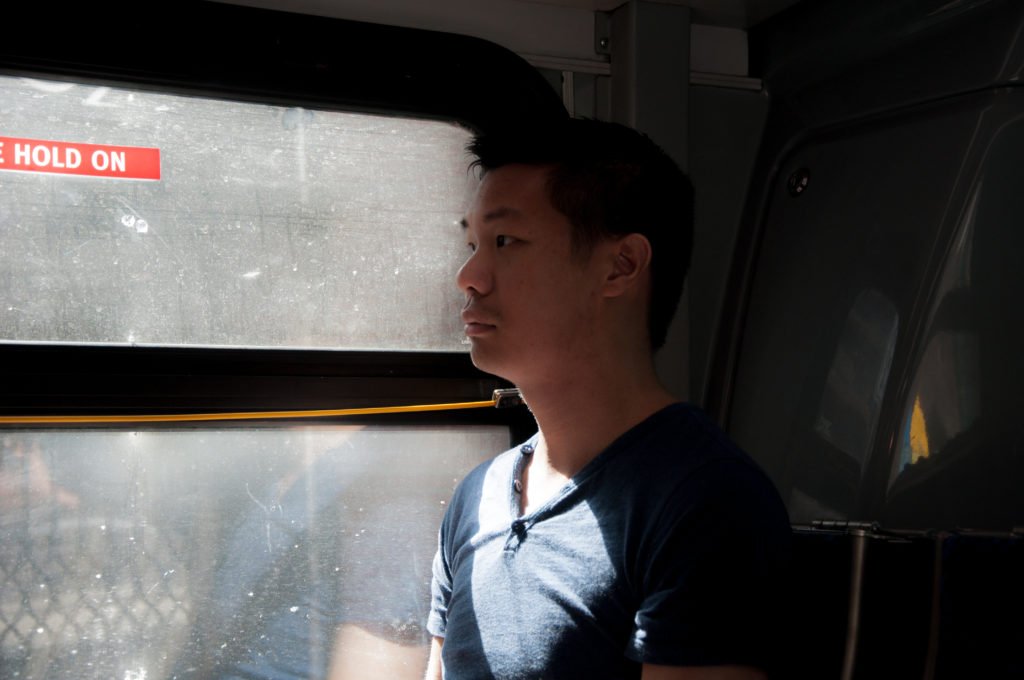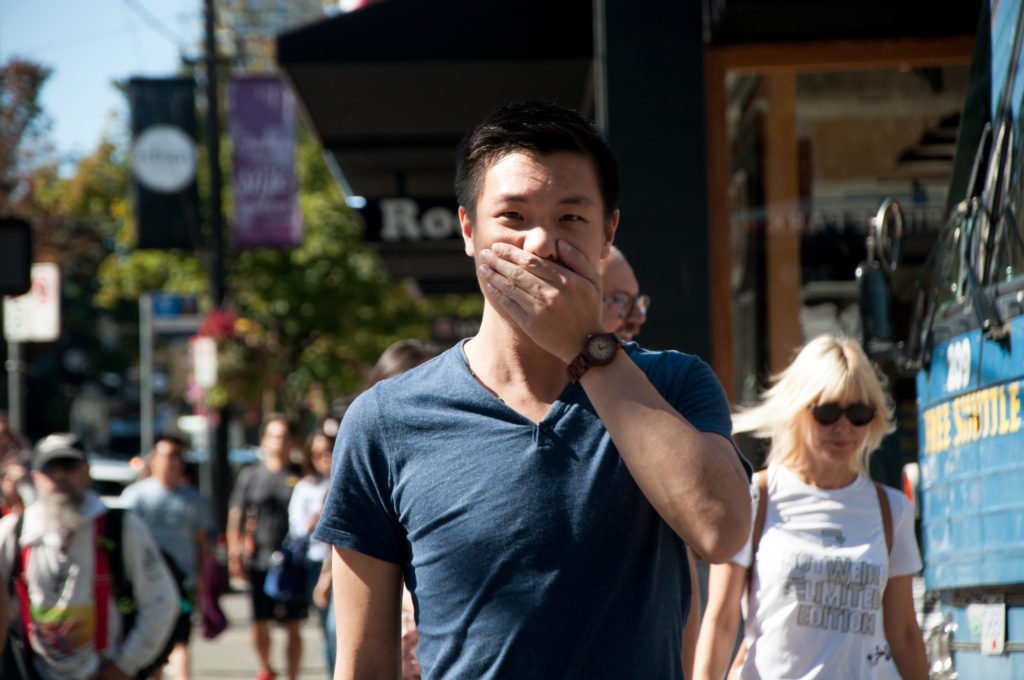“Being gay is not natural.”
I had heard and read this phrase everywhere growing up as a gay teenager, but I didn’t expect it to come from my Grade 10 social studies teacher.
It must’ve been Canadian politics week in Mr Walsh’s (not his real name) class because we were talking about government, in what seemed like just another day at my West Side public high school in Vancouver.
The subject soon drifted to the Conservative Party, before meandering over to gay issues because same-sex marriage was a much-discussed topic at the time as it wasn’t yet legal.
When I say the class was participating in a discussion around politics, I mean that Mr Walsh, the school’s trying-too-hard-to-be-cool-with-his-students teacher, was at the front of the room, reclining against the edge of the table, voicing his opinions, rather than asking any of us what we thought.
The “discussion” tumbled along and I slipped into tuning out every other word of Mr Walsh’s tenor voice, until I was jolted back from staring at Ian Parkinson and his curly brown hair the next row over.
“Being gay is not natural.”
Everything became still, like in the eye of a storm. It took me a few seconds to realize I had in fact heard correctly; the words hung like a dense fog around me.
I immediately thought back to an ’80s-looking paperback that I had borrowed a few years earlier from the library about homosexuality. That book had taught me that animals, ranging from penguins to seagulls to mountain lions, were all found to have same-sex partners, thus dispelling the notion that homosexuality was unnatural.
Simmering with rage, I quietly put up my hand and waited for him to call on me. His eyes flicked over in my direction for a split second, then he continued.
“You don’t see gay things in nature. You don’t see male animals together or female animals. It’s just not natural. It’s not right,” he insisted.
As Mr Walsh took a breath, a classmate seized the momentary pause and confidently countered, “There are gay dolphins.”
Again, there was silence. This time, it stretched itself out like a rubber band, and I waited for the sharp sting of recoil.
Scientists have found that some dolphins are only interested in other dolphins of the same sex, my classmate explained. Mr Walsh stared at him wordlessly. The ability to make babies must count for something when weighing how natural something is, my teacher finally retorted.
My hand swayed in the air. I longed to back up my classmate’s comments, but then the bell rang. Mr Walsh didn’t call on me. The classroom door opened, spilling noise from the hallway into our quiet room as everyone filed out, more or less without a sound.
This wasn’t a private religious school. This was a public school on the West Side of Vancouver. I thought public schools were supposed to have liberal attitudes, but I guess I was wrong.
I had only come out to my friends the year before but I knew that what I felt was normal. I knew I wasn’t sin personified. What I didn’t know was how my classmates felt.
One in 10, they say. If my class had 30 kids, there may have been two other gay or queer teens sitting around me. What were they thinking as they walked out of class?
I imagined them Googling “gay unnatural” and finding organizations that spew hate, that tell teens they deserve violence and death. Or maybe one of my classmates had been thinking about coming out, only to decide not to because our school seemed unsafe. I’ll never know.
I wasn’t sure if I should have told someone about my teacher; apart from a few close friends, I didn’t bring it up. It’s not that I was afraid to tell the principal or the school board, but I honestly didn’t know if they would take me seriously or if anything would even be done.
“What’s the big deal? He’s a teacher. He’s allowed to say things,” I imagined them telling me. “What do you want us to do?”
I mean, if he had said something racist, people might’ve responded, I thought. Considering students said, “that’s so gay” and “fag” in front of teachers all the time and teachers never did anything about it, why would anyone care now?
And if students were allowed to say homophobic things and get away with it, why wouldn’t teachers?
***

Credit: Moe Yang/Xtra
About a month or so later, a small group of students and I formed the school’s first Gay-Straight Alliance (GSA). One of the first things the GSA did was to offer rainbow stickers that staff could put on their classroom doors to show it was a safe zone for students. The sign-up sheet for teachers was posted in the office.
When I checked the list a few weeks later to see how many stickers to order, I was disappointed that it was a lot shorter than I had expected. Putting a sticker on a door didn’t seem particularly offensive to me, so I wondered why more teachers didn’t sign up.
Then I saw his name on the list.
“Surprised at who didn’t sign their name?” asked our staff representative, looking over my shoulder.
“No. I’m surprised who did,” I replied, staring at Mr Walsh’s scrawled name.
I’ll never know if he signed up because he didn’t want to be seen as homophobic or less than cool, or if he had actually changed.
After that school year, I never had another class with Mr Walsh, and apart from a few sightings in the hall every so often, I didn’t see much of him for the rest of my time in high school.
But the incident still bothered me. I had sat quietly as people slung homophobic slurs around me in my high school halls, in my classrooms. I had countless opportunities to object. I never did.
It was especially intimidating to speak up when people said homophobic things around me in groups, egged on by their friends. Most of the time, they were loud, rowdy, vulgar, mean-looking people (usually bro dudes) who I imagined had been in more than one brawl.
Was I supposed to confront them, correct them? I was a young, shy, scrawny pacifist Asian kid who would much rather challenge them in a game of wits or lecture them on the power of words (to which bro dudes aren’t typically receptive).
They could have shouted at me, or worse, called me fag and kicked the shit out of me. I’d have gone home with black eyes and cuts only to face the verbal assault from my mom yelling that it was my fault for getting into trouble and being confrontational when I should’ve minded my own business in the first place.
Having heard and read countless stories about gay teens harassed and bullied in high school by their peers, where those who speak up are never rewarded, keeping silent was a form of survival for me.
But afterwards, I hated myself — for not saying anything, for passively giving them permission to spew hate, for allowing anyone listening to believe that was acceptable.
The cycle of hate spread and continued. On top of all this, every time I sat passively while words were hurled around me, I felt this knot in my stomach, as if my body was begging me to do something in the moment, and shaming me after I hadn’t.
I tried to reassure myself: Next time, I’ll be brave. Next time, I’ll speak up. But time and again, I always found a reason not to. And as the silence grew, the knot wound tighter and tighter. It swallowed my voice, my power. For a while, it felt like I had given in to my self-censorship.
But there was one notable exception to my silence.
Months after the Mr Walsh incident and the GSA’s somewhat quiet launch, I was on the bus heading home from school. The sound of giggling and chatter filled the bus as two girls wearing red plaid skirts and white button-up shirts — private school uniforms — boarded. They looked to be about 12 or 13, almost high school age.
One took the seat next to me, while her friend plopped down across the aisle. I didn’t pay much attention to them, and only tuned into their conversation when the one sitting next to me casually remarked, “That’s gay.”
It’s always easier said than done. Anyone can say that the right thing to do is speak up and correct her, but when I’m in that moment, fear grips me, clamps my jaw tight. I remained silent, as always, and no one else intervened either. Her friend laughed, and I shifted uncomfortably in my seat and stared out the window at the passing world. But I knew I couldn’t find the answers out there. I could only see my reflection.
Step One: Open mouth.
Step Two: Speak.
I formulated the words in my head and took a breath.
“Could you . . . not say that, please? It’s . . . kind of offensive.”
The voice sounded foreign, like I had opened my mouth and words fell out of a pre-recorded machine. Near the end, my low voice, almost cracking, practically trailed off into meekness, the uncertainty of claiming such words. Yet, even as the heat of embarrassment rose up to my throat, the schoolgirl’s smile disappeared.
“Oh. Okay. Sorry,” she said. And that was it. She stopped.
I’m not sure what it was that finally let me speak out that day. It could have been that I was just tired of holding everything in. It could have been that speaking up to two young girls felt less risky; had they been two guys, I likely would have kept quiet and let the knot of silence stifle me further.
My reluctance to speak up against Mr Walsh, an authority figure — my willingness to politely wait for his permission to speak, and the loss I felt when he withheld that permission — festered inside me. (Years later, I even posted about it in an online forum and was deeply relieved to find people who validated my experience.) But for that brief moment on the bus, I reclaimed by voice.
Upon my interjection, the schoolgirl and her friend stopped talking altogether, and her gaze turned down to the floor where it remained. A different sort of silence drifted down on everyone on the bus, and as I looked ahead, the knot in my gut loosened ever so slightly.
It was in that moment, as my pounding pulse returned to normal, that I discovered a strange, new, powerful emotion.
As the bus pulled away from the curb, I quietly and secretly burned with the reward for my defiance: the feeling of knowing I had done the right thing. Shamelessness.

 Why you can trust Xtra
Why you can trust Xtra


